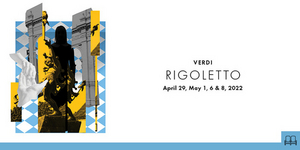For The First Time In 15 Years, Verdi's RIGOLETTO Comes to The Academy Of Music
Performances run April 29-May 8.

Opera Philadelphia returns to the Academy of Music stage for the first time since September 2019 with four performances of Rigoletto from April 29-May 8. Long one of the most popular works in the operatic canon, Verdi's unforgettable tragedy has not been performed by Opera Philadelphia in 15 years, making this new production an extra special event on the region's spring performing arts calendar.
Adding to the excitement of the new production is a cast of rising opera stars making their Opera Philadelphia debuts in Rigoletto. Baritone Anthony Clark Evans, lauded for his "stentorian Verdi style" by the Chicago Tribune and as "warm-toned, vivacious and humane" by the San Francisco Chronicle, makes his company debut in the title role of the Duke's jester Rigoletto. British-American tenor Joshua Blue makes his company and role debuts as the philandering Duke of Mantua, fresh off appearances as Peter in The Gershwins' Porgy & Bess. Baltimore-born soprano Raven McMillon, a winner in the 2021 Metropolitan Opera National Council Auditions, makes in her company and role debuts as Gilda, Rigoletto's daughter. McMillon, whose 2021-2022 season featured a star-making turn as Peter in the world premiere of Joel Thompson's The Snowy Day with Houston Grand Opera, was recently named one of the 22 stars to watch in 2022 by the Washington Post."The 2021-2022 season has been a journey towards returning to a new normal at Opera Philadelphia, as we get back to bringing audiences and artists together for live performances while also integrating cinematic work into our ongoing exploration of the future of opera," said David B. Devan, General Director & President of Opera Philadelphia. "This return to the Academy of Music for the first time in nearly three years feels like a huge milestone moment for us, following performances at the Mann Center for the Performing Arts, Verizon Hall, and streaming on the Opera Philadelphia Channel. It will feel good to be back on our home stage, with Maestro Corrado Rovaris leading the Opera Philadelphia Orchestra and Chorus and an exciting cast of singers."
When the stage director created the production for New Zealand Opera in 2012, former Italian Prime Minister Silvio Berlusconi was breezing through a high-profile sex trial. Back then, Hume found inspiration in the controversial billionaire and politician for the Duke of Mantua; Hume's production is in fact set at the "presidential palace" on election night. Now, presenting this piece for American audiences, Hume acknowledges some may find a similarity between the Duke and certain U.S. politicians.
Comments

Videos

